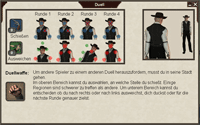Duelli
Duelli
Esistono due tipi di duelli: duelli tra giocatori e duelli contro NPC (Personaggi non umani generati dal sistema)
Duelli tra giocatori
Un duello è un combattimento tra due giocatori. Per effettuare un duello devi far parte di una città avente il becchino; a questo punto basta recarsi in una città straniera e cliccare nel saloon ottendo così una lista dei giocatori che si possono duellare o meno. Non tutti i giocatori possono essere sfidati, ecco alcuni esempi:
-Se lo sfidato sta dormendo non può essere sfidato -Se lo sfidato è svenuto non può essere duellato per 48h -Se lo sfidato è già stato duellato dal proprio personaggio si dovrà aspettare 1 ora prima di poterlo sfidare nuovamente
Ogni duello costa 12 punti energia.
Dal menù "duello" è possibile settare la propria strategia.
Il duello
Un duello è composto da otto round. Ogni giocatore ha otto opportunità di effettuare e schivare colpi. Lo sfidante è colui che attacca, lo sfidato colui che si difende. Per infligere un colpo serve avere un buon valore di attacco. Per schivare un attacco serve avere un buon valore di difesa.
Valore di attacco
Il valore di attacco viene determinato dalla capacità 'mirare'.
Viene abbassato o il valore di attacco o dell'attaccante o del difensore. Grazie alla capacità 'tattica', il difensore può sfruttare il vantaggio di casa. Sceglie la posizione migliore per il duello e sfrutta la conoscenza del luogo. Con la capacità 'aspetto', lo sfidante può intimidire l'avversario. Se il livello di tattica del difensore è più alto del livello di aspetto dell'attaccante, allora il valore di attacco dell'attaccante scende. In caso contrario si abbassa il valore di attacco del difensore. Più è grande la differenza, più scende il valore di attacco.
In aggiunta, ogni giocatore riceve un bonus di valore cinque.
Valore di difesa
Il valore di difesa viene determinato dalla capacità 'schivare'.
In aggiunta, ogni giocatore riceve un bonus di valore cinque.
Scambio di fuoco
In ogni duello, entrambi i giocatori attaccano 8 volte, cercando di colpire l'avversario, ferendolo. L'attaccante inizia con il primo colpo. Esistono sia armi da fuoco che da contusione. Per semplificare, il duello viene spiegato solo con le armi da fuoco.
Ad ogni sparo, il valore di attacco del giocatore che ha sparato viene confrontato con il valore di difesa del giocatore in difesa. Vengono calcolati 2 numeri casuali, da uno al valore di attacco (o di difesa) e paragonati. Se è più alto il valore di attacco, l'attaccante colpisce e il difensore viene ferito. Se è più alto il valore di difesa, l'attaccante non colpisce. Dopo un tiro, il difensore diventa attaccante.
Danno
Viene causato del danno quando il valore di attacco è più alto del valore di difesa. La quantità del danno dipende dall'arma del giocatore che ha messo il colpo a segno. Ogni arma ha un danno minimo e uno massimo. Ogni volta che un giocatore colpisce, viene stabilito un numero casuale fra il danno minimo e quello massimo. Il giocatore colpito subirà poi quel danno.
Esistono due tipi di arma da duello, armi da fuoco e da contusione. Il danno delle armi da contusione aumenta con il vigore del giocatore che la brandisce e diminuito dalla Robustezza del giocatore colpito. Con le armi da fuoco il danno viene alzato dalla capacità 'sparare' e diminuito dalla capacità 'riflessi'. Un giocatore con una grande forza farebbe dunque meglio ad usare armi da contusione, mentre un giocatore abile a sparare dovrebbe usare un'arma da fuoco.
Striking zones
You can set a dueling tactic by clicking on the menu 'Duel'. By setting the striking and dodging zones you can also alter the damage.
Here you can set a few different things. For one you can set where you want to aim. Depending on the area you hit you make different amounts of damage. If you hit a shoulder you make 15% more damage. Hitting the head creates 50% more damage.
You can also set which way you are trying to dodge. If you dodge with the body part that the attacker was aiming at, your dodging skill gets doubled.
- You can just duck down and by that protect the head and both shoulders.
- You can duck to the left and protect your head, your right shoulder and your right arm.
- You can duck to the right and protect your head, your left shoulder and your left arm.
- You can choose not to try to dodge and have more concentration for the next round. This doubles your attack value.
A duel lasts 8 rounds. The settings for round one are also used for round 5 and so on.
Winning a duel
The player that causes more damage in the duel wins. If both players cause the exact same amount of damage, the defender wins. If a player loses all his health points in the duel, he passes out. In this case the other player is always the winner of the duel even if he caused less damage.
Dueling requirements
There are a few conditions for starting a duel. Some players may not challenge each other.
- The defender has to be member of a town
- The challenger has to be member of a town. This town also needs a mortician.
- The challenger has to visit the town of the defender. The defender does not have to be in his town.
- The challenger needs at least 12 energy points.
- Both players have to be able to gain experience points from the duel. These are calculated from the dueling level.
- You may not challenge the same player more than once per hour.
- The defender may not have been knocked out within the last 48 hours.
- The challenger may not have been knocked out within the last 48 hours.
- The defender cannot be sleeping in a hotel.
Dueling reward
The winner of the a duel gets two rewards.
The winner receives a part of the cash the defender was carrying around. If the defender doesn't carry any money, the winner doesn't receive anything. If the defender gets knocked out he loses all his cash. The winner still only gets some of it.
The winner also receives experience points for the duel. How many points are received depends on the dueling level of the opponent.
Experience = (7 * duelling level of loser) - (5 * duelling level of winner) + 5
The winner receives at least 5 experience points.
Dueling level
The dueling level of a player is calculated from his character level and the experience points the player has earned in duels. The more points were received, the higher the dueling level
Motivation
With each duel the motivation goes down by 3 points. A lower motivation means that less experience points and money are received. With a motivation of 50% the winner only receives half of the calculated points. It is always your own motivation that counts even if the defender wins. The motivation automatically goes up by 10 points per day.
Duels against NPCs
Duels against quest givers work the same way as other duels against players. There are however two major differences:
- The Quest opponent does not take any money from you, even if you lose the duel.
- You can challenge a quest opponent as often as you want, until you win the duel. There is no waiting time like with challenging other players.
Careful: Even against a questgiver you can pass out and by that lose all of your money.





















